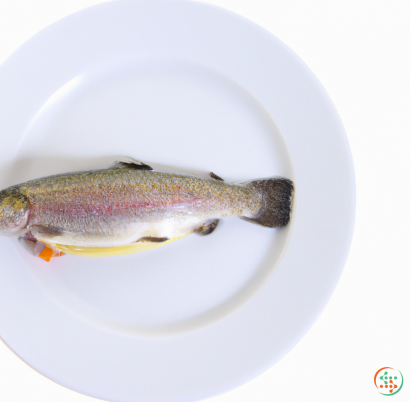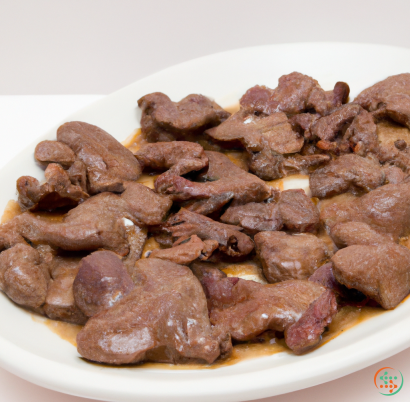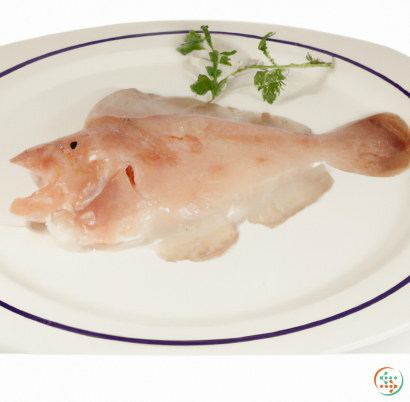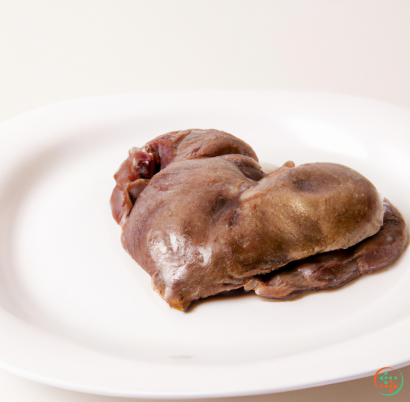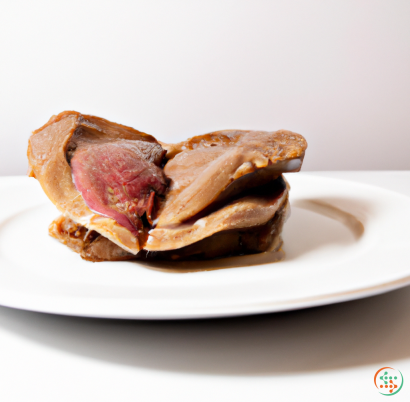Beef Liver
What is beef liver?
Beef liver is one of the most nutrient-dense foods you can eat – and it has some surprising health benefits. It’s the organ meat of cattle, and is packed with protein, vitamins, minerals, and essential fatty acids. Here we dive into the nutritional value of beef liver, and explore why you should add this nutrient powerhouse to your diet.
The nutrient counts
Beef liver is a nutritional powerhouse, containing all essential amino acids, small amounts of carbohydrates and fat, plus high concentrations of several vitamins and minerals. It also contains a surprising amount of cholesterol. Here is a breakdown of the major nutrients in beef liver:
• Protein: 4.2 g
• Fat: 3.2 g
• Carbs: 2.2 g
• Sodium: 32 mg
• Potassium: 310 mg
• Iron: 15.5mg
• Zinc: 7.4mg
• Vitamin B6: 0.6mg
• Vitamin B12: 78mcg
• Vitamin A: 22,488 IU
• Cholesterol: 418mg
The protein content of beef liver is considered the highest of any organ meat. It also has high concentrations of vitamin B12, iron, and zinc – all of which are essential for optimal health. Vitamin A, or retinol, is another important nutrient found in beef liver. It helps protect against vision loss and certain cancers, as well as maintain healthy tissues throughout the body.
Health Benefits of beef liver
Beef liver is an excellent source of several vitamins and minerals, making it an excellent choice for overall health and wellbeing. Here are some of the ways that beef liver may improve your health:
• High in essential vitamins and minerals – One of the biggest benefits of beef liver is its nutrient density. Beef liver contains B vitamins, iron, zinc, and other essential vitamins and minerals that are important for your health.
• Helps improve digestion – Beef liver is also high in dietary fiber, which can improve digestive function and prevent constipation and other common digestive issues.
• Packed with antioxidants – Antioxidants help fight off free radicals and reduce oxidative stress, which is linked to various chronic diseases and accelerated aging. Beef liver is packed with Vitamin A, an antioxidant that helps protect cells from free radical damage.
• May help boost immunity – Beef liver is an excellent source of Vitamin B12, which is essential for immune system function. Vitamin B12 also helps maintain a healthy nervous system and can improve mood.
• May improve heart health – Beef liver is high in cholesterol, but studies show that it has beneficial effects on heart health. High cholesterol is not always unhealthy, and eating beef liver can actually help reduce harmful cholesterol in the body and improve heart health.
How to cook beef liver
Beef liver can be cooked in a variety of ways to bring out its nutty flavor. The most popular methods include braising, pan-frying, and baking. However it’s cooked, beef liver should not be overcooked, as this can make it tough and unpalatable.
When buying beef liver, look for packages labeled “organic” if possible, as this will indicate that the liver was processed without the use of hormones or antibiotics. If you can, buy livers from local butchers, as this will ensure that you are getting the freshest and highest-quality product.
Beef liver is a nutritious and versatile organ meat that’s often overlooked. It’s packed with essential vitamins and minerals that can help improve digestion, boost immunity, and promote heart health. When cooked properly, it has a delicious nutty flavor that’s worth exploring. Give beef liver a try today – you won’t regret it!
Beef Livers and the Journey from Livestock to Dinner Plate
Beef livers play an important role in many cuisines around the world, providing an excellent source of vitamins, minerals, and other essential nutrients that are needed to maintain a healthy, nutritious diet. From the livestock all the way to the dinner plate, beef livers have a surprisingly complex journey that begins with the feeding and care of the animals, continues with slaughter and processing, and finally reaches our fork-ready. To add to the complexity, each country has its own unique processes and regulations that must be followed throughout the journey so today we'll explore the journey from the field to the frying pan, beginning with the birth and raising of the livestock.
Raising livestock for beef liver and other food production is a complicated business. From the birth of the livestock, early and proper care must be given at every stage of the animal’s life so that it reaches the ideal weight and quality necessary for processing into food products. Livestock raised for beef liver is usually either from a cow, sheep, or pig, with much of the commonly available bovine liver coming from herds of cattle raised in feedlots or on ranches. Cows, which are usually the only animal used in commercial beef production, undergo a special diet and growth-promoting processes before being ready for slaughter and processing.
The first step in raising the animal is to ensure it is properly fed and cared for. Each species of livestock requires different types of feed, determined by the animal’s size, weight, and activity level. With proper diet, exercise, and living conditions, the animal reaches maturity and is ready for slaughter.
Slaughter is the process in which animals are humanely killed in order to make the best use of their flesh and organs. The major methods of slaughter include stunning, electrical stunning, and osmotic pressure. Prior to the slaughter, the animals are typically stunned, a process that renders them unconscious prior to the bleed-out. This reduces their sensitivity to pain and improves their quality of meat. The slaughterhouse often prepares animals for slaughtering according to its specific requirements. For example, some abattoirs withhold food to render the meat a more desirable color.
The most widely used method of slaughtering cattle for beef liver is the high-throughput stunning system, which uses a combination of stunning and other immobilization techniques. After stunning, the carcass is suspended and the blood is generally allowed to fully drain from the animal. Some plants use a carcass washer, which spins the carcass to cool the meat down and remove the fat and viscera.
After slaughter and before the meat is sent to processing, the animals are inspected by enlisted inspectors and/or veterinarians to make sure they meet requirements and are safe to eat. Skinning is then done to remove the hide, extra fat, and any unwanted material. The lungs, heart, and other organs are then removed, leaving only the liver and other edible organs behind. The liver is then removed and placed in a separate container for further inspection. The liver is cut and separated into several pieces according to standard specifications.
bl_liver_on_table
The next step of the journey is processing, in which the liver is prepared for consumption. This process begins with a wash that removes any traces of blood. Next, the meat is tenderized, a process that loosens the muscle fibers and makes the meat more tender and juicy. After tenderizing, the liver is cut into slices and coated in a mixture of salt, pepper, and other spices. This helps to reduce the organ’s raw flavor and give it a more palatable taste. The liver is then sometimes cooked or smoked before it is packed and sent to the market.
At the market, beef liver is packaged in vacuum pouches, boxes, trays, or other containers to keep the product fresh until it reaches the dinner plate. After purchasing, the liver should be refrigerated and used within an appropriate time frame. It is important to note that the liver should not be frozen for more than a short amount of time because freezing changes the texture and flavor of the liver.
The final step of the journey is cooking the beef liver. In many countries, beef liver is pan seared or boiled first, and then finished off with butter, olive oil, garlic, onions, and herbs for added flavor. It is also popular to fry beef liver in butter, oil, or both, as this helps to preserve its flavor. The cooked beef liver should be eaten immediately, as it can spoil quickly when exposed to the air.
Beef livers have a long journey from livestock to dinner plate, and understanding these steps can help consumers make better food choices. From proper raising and feeding practices to slaughter and processing, there are a variety of regulations and processes that must be followed to guarantee the best eating and nutritional experience possible. As a result, these processes help to ensure that the beef liver we consume is as safe, nutritious, and delicious as possible.
| Vitamin A | 0.009442 grams | |
| Beta-Carotene | 0.162 mg | |
| Alpha-Carotene | 0.011 mg | |
| Vitamin D | 0.0012 mg | |
| Vitamin D3 | 0.0012 mg | |
| Vitamin E | 0.51 mg | |
| Vitamin K | 0.0033 mg | |
| Vitamin C | 0.0019 grams | |
| Vitamin B1 | 0.19 mg | |
| Vitamin B2 | 0.00343 grams | |
| Vitamin B3 | 0.01753 grams | |
| Vitamin B4 | 0.426 grams | |
| Vitamin B5 | 0.00711 grams | |
| Vitamin B6 | 0.00102 grams | |
| Vitamin B9 | 0.253 mg | |
| Vitamin B12 | 0.07058 mg |
| Calcium | 0.006 grams |
Daily Value 1.3 g
|
| Iron | 0.00654 grams |
Daily Value 0.018 g
|
| Magnesium | 0.021 grams |
Daily Value 0.4 g
|
| Phosphorus | 0.497 grams |
Daily Value 1.25 g
|
| Potassium | 0.352 grams |
Daily Value 4.7 g
|
| Sodium | 0.079 grams |
Daily Value 2.3 g
|
| Zinc | 0.0053 grams |
Daily Value 0.011 g
|
| Copper | 0.01428 grams |
Daily Value 0.9 mg
|
| Manganese | 0.36 mg |
Daily Value 0.0023 g
|
| Selenium | 0.0361 mg |
Daily Value 0.055 mg
|
| Tryptophan | 0.368 grams | |
| Threonine | 1.215 grams | |
| Isoleucine | 1.352 grams | |
| Leucine | 2.67 grams | |
| Lysine | 2.247 grams | |
| Methionine | 0.759 grams | |
| Cystine | 0.526 grams | |
| Phenylalanine | 1.515 grams | |
| Tyrosine | 1.128 grams | |
| Valine | 1.761 grams | |
| Arginine | 1.735 grams | |
| Histidine | 0.879 grams | |
| Alanine | 1.627 grams | |
| Aspartic Acid | 2.694 grams | |
| Glutamic Acid | 3.652 grams | |
| Glycine | 1.627 grams | |
| Proline | 1.343 grams | |
| Serine | 1.265 grams |
| Total Sugars | 0 ug |
per 100g
|
| Myristic acid (14:0) | 0.04 grams |
|
| Palmitic acid (16:0) | 0.79 grams |
|
| Stearic acid (18:0) | 2.02 grams |
|
| Behenic acid (22:0) | 0.02 grams |
|
| Total Saturated fatty acids: | 2.87 g | |
| Oleic acid (18:1) | 1.02 grams |
|
| Palmitoleic acid (16:1) | 0.08 grams |
|
| Total Monounsaturated fatty acids: | 1.1 g | |
| Omega-6 Eicosadienoic acid (20:2) | 0.01 grams |
|
| Omega-6 Gamma-linolenic acid (18:3) | 0.03 grams |
|
| Omega-3 Alpha-linolenic acid (18:3) | 0.02 grams |
|
| Total Polyunsaturated fatty acids: | 0.06 g | |
| Cholesterol | 0.4 grams |
|
| Total Sterols: | 0.4 g | |



